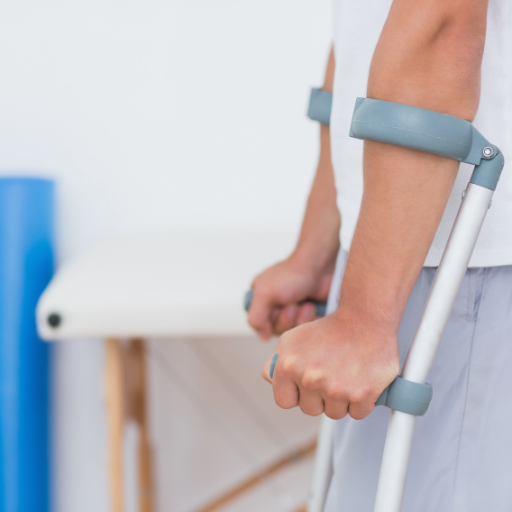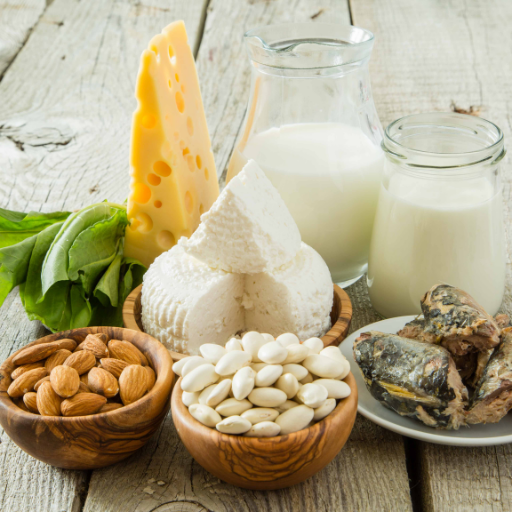Vitamin D for bones: How can a vitamin D supplement support bone strength?
Vitamin D for bones: How can a vitamin D supplement support bone strength?
Vitamin D is an important component of our body's skeletal and muscular health and maintenance. That’s because our skeletal and muscular systems are what give our bodies their shape! While calcium is better known for supporting bone health, without vitamin D for bones, it would be very difficult for our body to absorb the calcium needed for our skeleton and muscles. In fact, a deficiency of Vitamin D can lead to long-term effects on our bones.
Vitamin D for bones: Why is it important?
Vitamin D maintains and supports bone health by controlling calcium levels in our blood. As is widely known, calcium is needed for strong bones, muscles, and overall health of our body (1). Calcium is also important for our heart and nerves to function properly, and for our blood to clot (2).
But our body needs vitamin D to absorb the calcium we get from either food or supplements. Vitamin D - specifically D3 - helps form calcitriol, an 'active' form of vitamin D that absorbs calcium in the stomach. If our body doesn't have any vitamin D, we won't be able to absorb calcium from the food or supplements we consume. If that happens, the body takes calcium from calcium deposits in our skeleton. This can weaken our bones and prevent the formation of new, strong bones (3).
The dangers of vitamin D deficiency

A lack of vitamin D can cause serious problems, especially for children and senior citizens.
Studies have found that vitamin D deficiency may be a contributing factor to bone weakness, bowed legs and other skeletal problems (4), while older people's bones can lose calcium as time goes on, making their bones more fragile and easier to break. Vitamin D deficiency in senior citizens also affects muscle strength, which increases the probability of falls, a common problem that could lead to substantial disability (5).
Sources of vitamin D for bones
A great way to keep up your levels is by consuming more food sources of vitamin D for bones. Unfortunately, only a few food sources contain vitamin D naturally.
Egg yolks, some mushrooms, and the flesh of fatty fish like herring, salmon, and mackerel are good sources of vitamin D, but consuming them only provides 10% of the vitamin D that we need (6).

Aside from consuming vitamin D supplements alongside a healthy diet, a great source of vitamin D is from the sun, which is why vitamin D is also called the “sunshine vitamin.”
Other sources of vitamin D include food products like cereals, sardines, dairy and plant milks, and orange juice (7).
Vitamin D supplementation
There are two types of vitamin D supplements in the market today; vitamin D2 and vitamin D3. Vitamin D2 is mostly found in plants, fortified foods, and some supplements, while vitamin D3—the type naturally produced in the human body—is also found in some animal foods (8). Scientists and researchers recommend prioritising vitamin D3 consumption as it is the variation already found inside us.
As the “sunshine vitamin” moniker suggests, exposing our skin to the sun's ultraviolet (UV) rays is one of the best sources of vitamin D. But balancing sun safety and getting an adequate amount of vitamin D can be rather tricky. As anybody who has spent too much time under the sun can attest, sunburn is a painful signal that you're getting too much sun. Too much exposure can also increase the risk of skin cancer (9). So always be mindful of your location's UV index for the day whenever you need to go out for a prolonged period of time. And make sure to have some sort of sun protection, like sunscreen, a hat, or clothes that provide ample coverage.

Our musculoskeletal system—that is, all of the body's bones, muscles, cartilage, tendons, ligaments, joints, and other connective tissue— supports our entire being and lets us move about. Think of it as our internal scaffolding. Making sure that our internal scaffolding is strong enough to last us up to our old age is a no-brainer, and making sure that you take enough vitamin D is a good habit to start with.
Ensuring that you get an adequate amount of vitamin D in your diet is no problem when you have a well-balanced diet. Pairing this with Vitable vitamins which come as a vitamin subscription box can help support healthy bones and beyond. You can curate a vitamin plan with vitamins tailored to your health and lifestyle, and we’ll take care of the rest with our special vitamin delivery service to anywhere in Australia.
Find out more about other areas that the above supplements can help you with:
Magnesium | Calcium Plus | Vitamin C | Vitamin D | Cranberry
*Always read the label. Follow the directions for use. If symptoms persist, talk to your health professional. Vitamin and/or mineral supplements should not replace a balanced diet.
References:
- Better Health. “Vitamin D.” Better Health. Published (n.d.) on https://www.betterhealth.vic.gov.au/health/healthyliving/vitamin-d. Accessed 17 October 2021.
- National Institutes of Health. "Calcium and Vitamin D: Important at Every Age." NIH Osteoporosis and Related Bone Diseases National Resource Center. Published (n.d.) on https://www.bones.nih.gov/health-info/bone/bone-health/nutrition/calcium-and-vitamin-d-important-every-age . Accessed 17 October 2021.
- National Institutes of Health. "Calcium and Vitamin D: Important at Every Age." NIH Osteoporosis and Related Bone Diseases National Resource Center. Published (n.d.) on https://www.bones.nih.gov/health-info/bone/bone-health/nutrition/calcium-and-vitamin-d-important-every-age . Accessed 17 October 2021.
- Orthoinfo. "Vitamin D for Good Bone Health." American Academy of Orthopaedic Surgeons. Published (n.d.) on https://orthoinfo.aaos.org/en/staying-healthy/vitamin-d-for-good-bone-health/ . Accessed 17 October 2021.
- Harvard School of Public Health. "Vitamin D." Harvard School of Public Health. Published (n.d.) on https://www.hsph.harvard.edu/nutritionsource/vitamin-d/ . Accessed 15 October 2021.
- NPS Medicinewise. "Vitamin D and COVID-19." NPS Medicinewise. Published 3 August 2020 on https://www.nps.org.au/news/vitamin-d-and-covid-19 . Accessed 15 October 2021.
- Health Direct. "Vitamin D deficiency." Health Direct. Published (n.d.) on https://www.healthdirect.gov.au/vitamin-d-deficiency . Accessed 17 October 2021.
- Harvard School of Public Health. "Vitamin D." Harvard School of Public Health. Published (n.d.) on https://www.hsph.harvard.edu/nutritionsource/vitamin-d/ . Accessed 15 October 2021.
- NPS Medicinewise. "Vitamin D and COVID-19." NPS Medicinewise. Published 3 August 2020 on https://www.nps.org.au/news/vitamin-d-and-covid-19 . Accessed 15 October 2021.